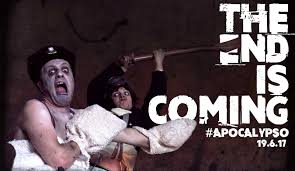Riverfront Theatre, 19th – 23rd June
The end of the world is a curious concept: the juxtaposition of a peaceful, eternal slumber set against the inevitable horrific violence that preceded it, and the final throes of a desperate humanity that, through instinct, attempts to cling on to the last memories of a glorious past. Most dystopian, post-apocalyptic worlds in fiction focus on an individual’s struggle to survive, frequently travelling ravaged wastelands in search of a society that bears a resemblance to the audience’s’ own (Cormac McCarthy’s The Road being the high-water mark in the genre). Solemn and world-weary, the protagonist would trudge from peril, through uncertainty, to the next hazard – all the time remaining po-faced and humourless. This isn’t the future Tin Shed Theatre Co. have explored in Apocalypso, instead they have imagined a future in which the audience are invited to the last bar on earth, where the “whiskey tastes on petrol and the end is nigh”.
There is no real hint as to why we are entering this truly dystopic world; was it Donald J. Trump killing all the bees by using “all the best word” or was it China dropping the nuclear bomb because of Boris Johnson’s continual insistence on calling table tennis, wiff waff? There is no clear answer, yet we meet an eclectic (and it is fair to say, rag-tag) group of individuals, who are counting down to their, and ultimately the world’s, end. The surrealist nature of this cast would not be out of place in any number of Adam Curtis’ documentaries; from a half-chicken-half-man (Justin Cliffe) to a stoic, gas-mask suited General (Georgina Harris), these exaggerated characters fit perfectly into any story signalling the end of days. As the clock counts down to zero, we are asked to follow a humorous and intensely physical performance through memory and loss in a state of hypernormalisation.
The audience is immersed into a chaotic, yet wonderfully designed and beautifully rendered, set that is as compelling as any of the characters we meet. Created from objects that would be presently considered mundane and disposable, they are, however, imbued with a reverence by the cast that is both touching and realistic. Chicken-Man’s affectionate story-telling with an all but destroyed National Geographic magazine, is a notable highlight of this production; the internal struggle to keep such a precious memento whilst also desiring to remain part of the group that is mocking his sentimentality, is the a rare moment of poignancy. Tin Shed have always excelled at injecting a level of pathos into an otherwise absurd situation, and Apocalypso is no different; the General’s delicate “chalking up” of another departure was a fine example of this craft and proves they have a genuine talent for emotive theatrical rhythm.
Apocalypso is a production that has adventure and innovation at its very heart. Attempting to take a Monty Python-esque view of a possible conclusion to current global events is both ambitious and admirable. However, there are a number of issues that stop this production attaining the lofty heights of previous shows that have been developed by Tin Shed. One such problem arose due to the interchangeability of the various characters; only the character of Mop (played very capably by Jeremy Linnell) had a distinct voice and story arc. Whilst the other actors’ lines seemingly could have been spoken by any other and their characters, by extension, suffered from a lack of focus on development. Furthermore, it felt like there was an overemphasis on humorous set piece “moments” at the expense of developing a coherent narrative, these junctures, that could have been filled with story progression or character development, instead were filled with a frenetic slapstick that sometimes missed its mark.
That said, overall the themes of memory and social normality were handled with wit and charisma. The bold choices regarding thematic tone and set design often paid off (with special mention to Chris Davies for the superb lighting design), consequently it was a production that bubbled and simmered with a physical energy. Though not fully rounded (Apocalypso could have benefited from possibly more time in development and an extended run a festival), it was an enjoyable hour with many moments that prove not all people in a post-apocalyptic world are po-faced or humourless. And if the end is nigh, there are far worse places to spend it than at Apocalypso: the last bar on earth.












